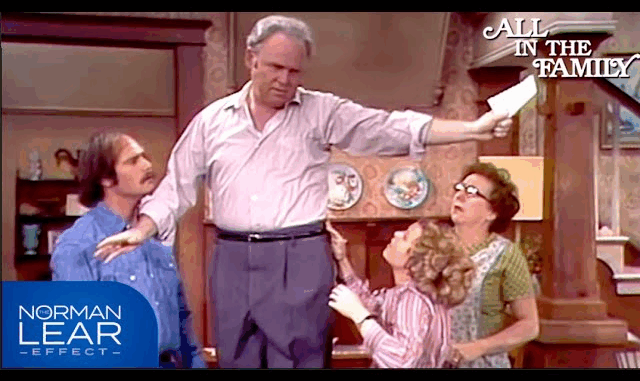
Before All in the Family, television largely served as escapist entertainment — tidy plots, cheerful families, and problems resolved in thirty minutes. But when Norman Lear introduced Archie Bunker to American audiences in 1971, he didn’t just create a sitcom — he rewrote the rules of what television could do. In the process, he helped invent a new kind of “smart television,” one that could entertain, educate, and even provoke.
At its core, All in the Family was revolutionary because it trusted its audience. It assumed viewers could handle — and even crave — complexity, contradiction, and discomfort. Rather than smoothing over society’s fractures, the show cracked them open, airing America’s tensions on prime-time TV.
Through Archie’s living room in Queens, All in the Family held a weekly town hall on issues like racism, feminism, gay rights, economic inequality, and political extremism. These weren’t just token mentions. Each episode was a carefully crafted exploration, written with wit and courage. The characters didn’t represent easy answers — they represented real people, struggling to coexist in a changing world.
Norman Lear’s genius was in his ability to blend humor with truth. His scripts didn’t preach. They made people laugh first — and then made them think. Underneath Archie’s rants was a challenge to confront our own assumptions. Beneath Edith’s quiet resilience was a commentary on the silent strength of overlooked women. Even the laughter came with a sharp edge, forcing audiences to question who — or what — they were laughing at.
But perhaps the most lasting achievement of All in the Family is the space it opened for future storytellers. It showed that sitcoms could be platforms for substance. Without it, there would be no Murphy Brown, Fresh Prince of Bel-Air, Modern Family, or Atlanta. Its DNA can be found in dramas, too — in any show that dares to mix social critique with character-driven narratives.
As of today, All in the Family is more than a TV classic; it’s a cultural touchstone. Its scripts are studied, its scenes quoted, and its themes still resonate. In an era of streaming and short attention spans, it remains a testament to the power of writing that is both fearless and funny.
Norman Lear didn’t just change TV — he elevated it. And with All in the Family, he reminded us that the stories we tell, and the truths we face, matter.
